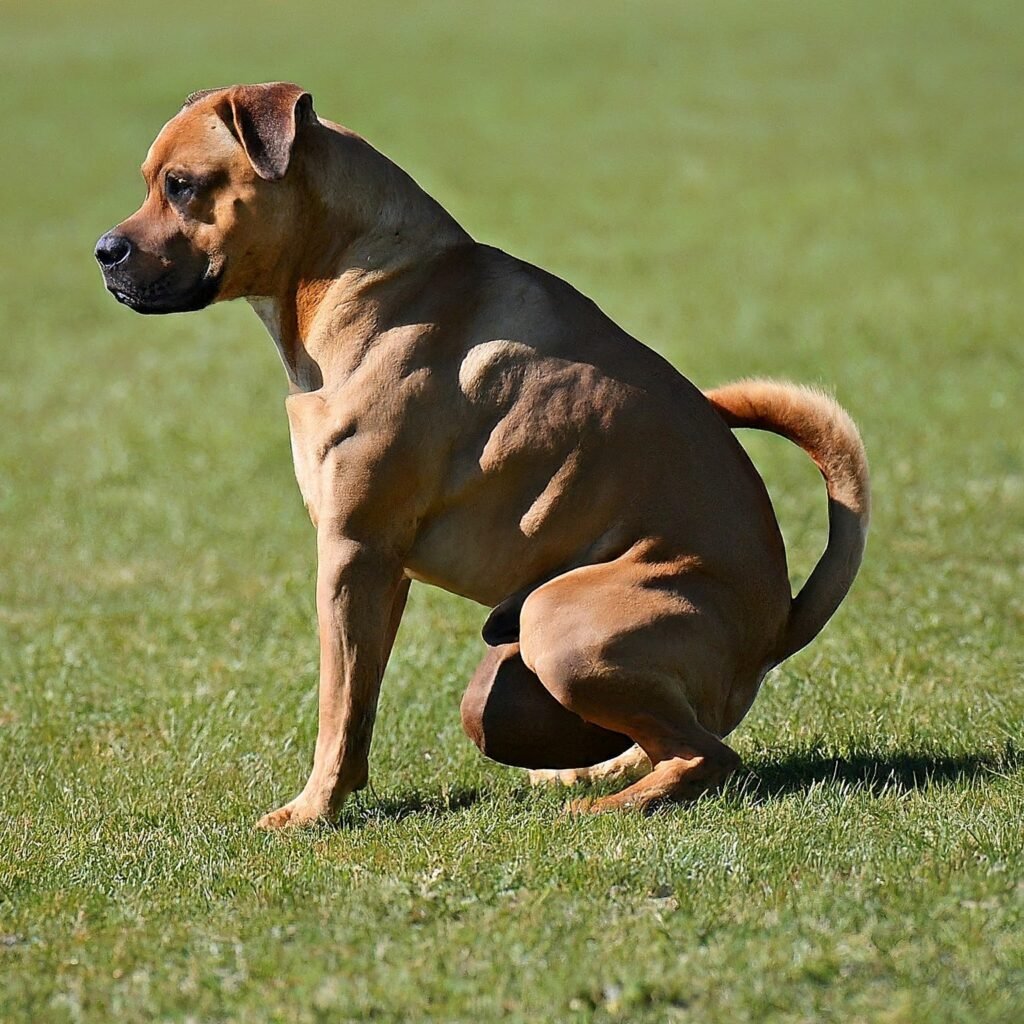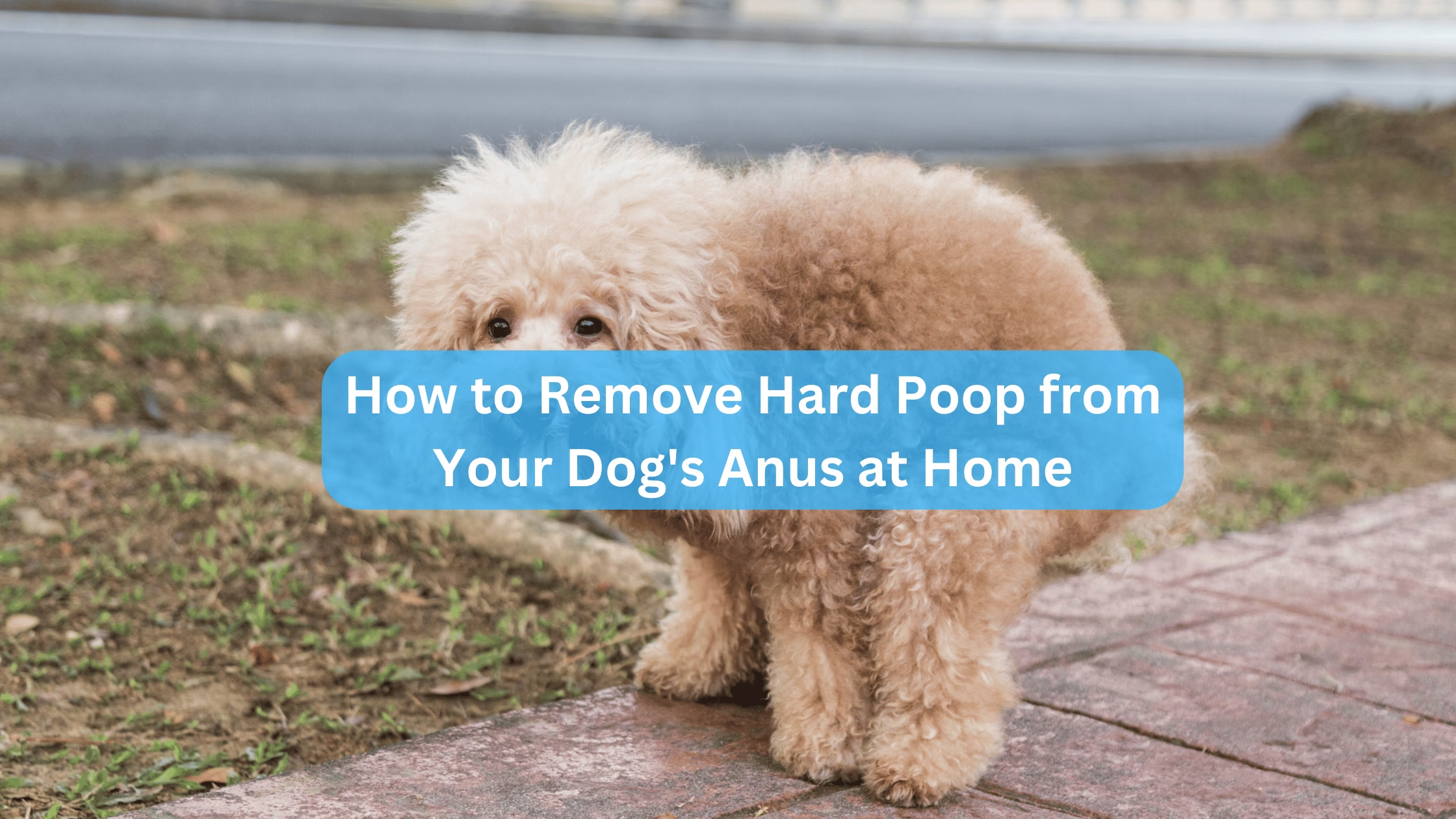Dealing with a dog that has hard poop stuck around their anus can be distressing for both the pet and the owner. This condition, often a sign of constipation, can lead to discomfort and even more serious health issues if not addressed promptly. Here’s a comprehensive guide on how to remove hard poop from your dog’s anus at home safely and effectively, along with preventive measures and answers to common questions.
What Causes Hard Poop in Dogs?

Hard poop, or constipation, can occur for several reasons:
- Dehydration: Insufficient water intake can lead to hard, dry stools.
- Diet: A lack of fiber in your dog’s diet can result in constipation. Dogs need a balanced diet that includes adequate fiber to maintain healthy digestion.
- Inactivity: Lack of exercise can slow down the digestive process.
- Health Issues: Conditions such as anal gland problems, intestinal blockages, or even more serious issues like kidney disease can contribute to constipation.
Signs of Constipation
Before attempting to remove hard poop, it’s essential to identify the signs of constipation:
- Straining to defecate
- Hard, dry stools
- Liquid or mucus around the anus
- Signs of discomfort or pain
- Lethargy or loss of appetite
If your dog shows severe signs of distress or has not defecated in 48 hours, consult a veterinarian immediately.
Steps on How to Remove Hard Poop from Your Dog’s Anus at Home
If the situation is manageable at home, follow these steps to help your dog:
1. Prepare the Area
- Gather Supplies: You will need rubber gloves, warm water, mild soap, a soft cloth or sponge, and possibly scissors or clippers for matted fur.
- Create a Comfortable Environment: Choose a quiet, comfortable space where your dog feels safe.
2. Soak the Area
- Warm Bath: Place your dog in a shallow warm bath. The warm water can help soften the hard feces. Allow your dog to soak for about 10-15 minutes.
3. Clean the Anus
- Gently Clean: After soaking, use a soft cloth or sponge with warm, soapy water to gently clean the area around the anus. Be careful not to apply too much pressure.
- Trim Matted Fur: If there is matted fur around the anus, carefully trim it away with scissors. Be cautious not to cut the skin.
4. Apply a Lubricant
- Use a Water-Soluble Jelly: After cleaning, apply a small amount of water-soluble jelly (like K-Y jelly) to soothe the area. This can help ease any irritation caused by the hard feces.
5. Encourage Elimination
- Take a Walk: A gentle walk can stimulate your dog’s bowels. The movement may help them pass the remaining stool.
Preventing Future Issues
To prevent constipation and hard poop in the future, consider the following:
- Increase Hydration: Ensure your dog has constant access to fresh water.
- Dietary Adjustments: Incorporate high-fiber foods into your dog’s diet. Canned pumpkin, green beans, or a fiber supplement can help.
- Regular Exercise: Engage in daily walks and playtime to promote healthy digestion.
- Routine Vet Check-ups: Regular check-ups can help identify any underlying health issues that may contribute to constipation.
Frequently Asked Questions
What should I do if my dog is straining to poop but nothing comes out?
If your dog is straining to defecate without success, it may be a sign of constipation or an obstruction. First, check for any signs of discomfort, such as whining or pacing. If your dog has not defecated in 48 hours or shows signs of distress, consult a veterinarian immediately.
Are there any home remedies for dog constipation?
Yes, some home remedies can help alleviate mild constipation. Increasing your dog’s water intake, adding fiber-rich foods like canned pumpkin or green beans to their diet, and ensuring regular exercise can promote healthy bowel movements. However, if symptoms persist, seek veterinary advice.
When should I take my dog to the vet for constipation?
You should take your dog to the vet if they have not defecated in 48 hours, exhibit severe straining or discomfort, have blood in their stool, or show signs of lethargy or vomiting. These could indicate a more serious health issue that requires professional intervention.
Can stress cause constipation in dogs?
Yes, stress can indeed lead to constipation in dogs. Changes in environment, routine, or even the presence of new pets can cause anxiety, which may affect their digestive system. Ensuring a stable environment and using calming techniques can help mitigate this issue.
How can I tell if my dog is dehydrated?
Signs of dehydration in dogs include dry gums, lethargy, loss of skin elasticity, and excessive panting. If you suspect your dog is dehydrated, encourage them to drink water and consult your veterinarian if symptoms persist.
What foods should I avoid giving my dog to prevent constipation?
To prevent constipation, avoid feeding your dog foods that are low in fiber, such as processed dog foods, and human foods that can be difficult for them to digest, like dairy products and certain grains. Stick to a balanced diet that includes high-fiber options.
Also Read: Can Dogs Have Glazed Donuts? A Comprehensive Guide
Also Read: Can Dogs Eat Vienna Sausages? A Comprehensive Guide
Conclusion
Removing hard poop from your dog’s anus can be a manageable task if approached with care and attention.
By following the steps outlined above and taking preventive measures, you can help ensure your dog remains comfortable and healthy.
Always keep an eye on their habits, and don’t hesitate to seek professional help when needed. Your dog’s health and comfort should always be the top priority.
Sources:
- https://www.thefarmersdog.com/digest/what-to-do-if-a-dogs-poop-is-stuck-halfway-out/
- https://blocked.goodrx.com
- https://www.wedgewood.com/blog/posts/10-home-remedies-for-dog-constipation.html
- https://www.msdvetmanual.com/dog-owners/digestive-disorders-of-dogs/disorders-of-the-rectum-and-anus-in-dogs







